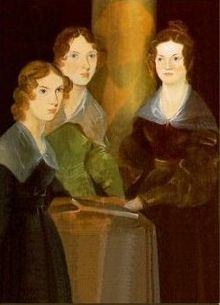Branwell Brontë
Patrick Branwell Brontë (born June 26, 1817 in Thornton , Yorkshire , † September 24, 1848 ) was an English painter and poet . He was the brother of the writers Charlotte , Emily and Anne Brontë .
youth
Branwell Brontë was the fourth child and the only son of the Irish clergyman Reverend Patrick Brontë (1777–1861; actually Patrick Brunty ) and his wife Maria Branwell (1783–1821). He was born in Thornton but moved with the family to Haworth when his father was entrusted with the parish there.
Of the four children who reached adulthood, Branwell Brontë appeared to be considered the most talented, at least during his childhood and adolescence. While four of his five sisters were sent to Cowan Bridge boarding school (which led to the deaths of two eldest sisters, Maria and Elizabeth), Branwell stayed at home, receiving private tuition from his father; he enjoyed a classical upbringing that qualified him for admission to Oxford or Cambridge .
Brontë worked as a writer together with his sisters as a child and created fictional worlds. One can see from the surviving youth work that he worked closely with Charlotte in particular. Together they created the fantasy world Angria.
Adult years
As a young man, Brontë was trained as a portrait painter in Haworth ; from 1838 to 1839 he practiced this profession in Bradford . His most famous portrait is that of his three sisters. Branwell wiped out his own portrait in the middle of the picture afterwards, because he didn't like the way he looked in the picture.
In 1840 Brontë got a job as a private tutor in Broughton-in-Furness , but was fired after less than six months. At that time he made a translation of Horace ; he presented it to Hartley Coleridge , who was probably very impressed by it. In 1841 he was hired as an accountant in the newly established Sowerby Bridge train station . Six months later, he was promoted to the station master of Luddenden Foot. In 1842, however, he was dismissed due to an accounting deficit attributed more to his incompetence than to criminal intent. During his phase as a private tutor and railway employee, he cultivated his literary ambitions and published poems under various pseudonyms in regional newspapers.
In 1843 Brontë took a new tutoring job in Thorp Green, where he taught the young son of the Robinson family. His sister Anne, who was the governess of the Robinsons' two older daughters, gave him this position. In the following years he wrote to a number of his friends that he fell more and more in love with Mrs. Robinson. In 1845 he was dismissed for unspecified reasons; on the basis of his own report to his family, the Robinson family's silence regarding the reasons for his dismissal, and subsequent monetary gifts from Mrs. Robinson through her servants, it is believed that he had an affair with Mrs. Robinson that was discovered by her husband . However, a careful examination of the circumstances suggests indecent behavior on the part of the teacher towards the student as a possible reason for the dismissal (some biographers even speak of seduction).
Brontë returned to his family at the Haworth rectory. The separation from Mrs. Robinson and the increasing improbability of a reunion shook him profoundly; he started drinking. Other sources place the beginning of his alcohol addiction as early as 1835/36, when Branwell's admission to the Royal Academy in London failed. In addition to his alcoholism , he is said to have been addicted to opium . When he developed delirium tremens , his behavior became irrational and dangerous. Charlotte's letters at the time testify to her annoyance at his behavior, but also to the patience her father showed towards his broken son. It was then that his sisters' first novels were accepted for publication, but it is unclear whether he was aware of this.
Brontë's severe addiction masked a life-threatening illness. Some biographies suspect the onset of tuberculosis , while other researchers assume that Branwell suffered from bronchitis and kidney failure , the latter due to his alcohol abuse. His family didn't realize he was seriously ill until he collapsed in front of the house and a doctor found he was terminally ill. Branwell died on September 24, 1848 with his family.
Web links
- Branwell Brontë on incompetech.com
| personal data | |
|---|---|
| SURNAME | Brontë, Branwell |
| ALTERNATIVE NAMES | Brontë, Patrick Branwell (full name) |
| BRIEF DESCRIPTION | British painter and author |
| DATE OF BIRTH | June 26, 1817 |
| PLACE OF BIRTH | Thornton (West Yorkshire) , Yorkshire |
| DATE OF DEATH | September 24, 1848 |

